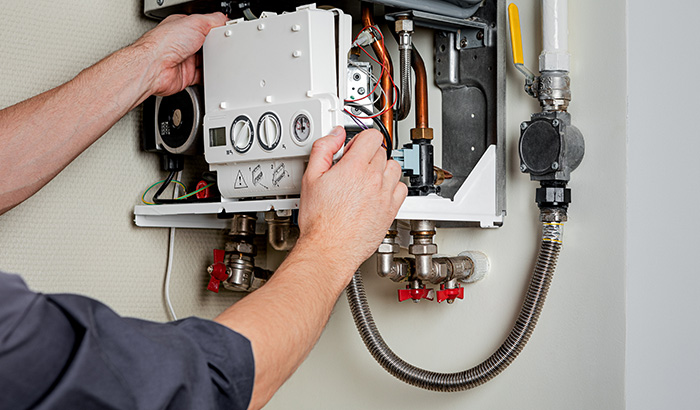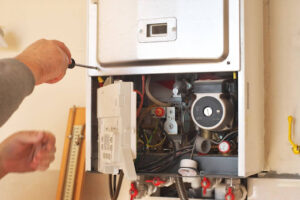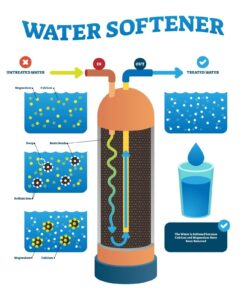A boiler provides essential heating and ensures a comfortable and safe environment for you and your family. However, like any home appliance, boilers experience wear and tear over time, leading to a need for repairs or even a complete replacement.
In this post, we’ll explore 15 signs that your boiler may need professional attention. Recognizing these signs early saves you from unexpected breakdowns and costly boiler repairs. From strange noises to efficiency issues, we’ll guide you through each indicator to help you understand when it’s time to call in a boiler repair service or get a boiler replacement.
1. Unusual noises
If your boiler starts making unusual noises, it’s a clear sign that something isn’t right. Banging sounds usually indicate delayed ignition, a serious concern that needs immediate attention.
Whistling or gurgling noises, often referred to as “kettling,” are usually caused by limescale build-up or air trapped in the system. These sounds signal that your boiler requires professional inspection and possibly repair.
2. Water leaks
Water leaks around your boiler are a symptom of an underlying issue. Leaks often indicate a failure in the boiler’s internal components, such as seals or valves. Ignoring these leaks leads to more severe problems. If you notice any water leakage, it’s crucial to call for a boiler repair service immediately to prevent further damage and ensure your safety.
3. Inconsistent heating
Experiencing uneven heating in your home? If some rooms feel like a sauna while others are chilly, or if your radiators struggle to heat up, it’s a telltale sign your boiler isn’t functioning correctly. This inconsistency often points to circulation problems within the boiler system.
4. Frequent cycling
Does your boiler turn on and off more frequently than usual? This frequent cycling could be a symptom of an underlying issue, such as a malfunctioning thermostat, incorrect boiler size for your home, or other internal problems. Not only is this inefficient, it also puts extra strain on your boiler and shortens its lifespan. A professional inspection can diagnose and resolve this erratic behavior.
5. Increased energy bills
An unexpected rise in your energy bills can often be traced back to boiler inefficiency. When a boiler ages or accumulates internal issues, it requires more energy to produce the same amount of heat, leading to higher costs. If you notice a spike in your energy expenses without a corresponding increase in usage, it might be time to have your boiler inspected.
6. Pilot light issues
A healthy boiler pilot light should burn a strong, steady blue. If you notice a yellow or flickering flame, it’s a sign of incomplete combustion. Incomplete combustion could be due to a carbon monoxide leak, which is a serious safety hazard.
Additionally, if your pilot light frequently goes out, it could indicate a faulty thermocouple or a blockage in the pilot tube. These issues require immediate attention from a professional.
7. Thermostat problems
Your thermostat controls the boiler’s operation. If you’re experiencing issues like your home not heating to the set temperature or the boiler not responding to thermostat adjustments, it could be a sign of a malfunctioning thermostat.
8. Boiler age
Like any appliance, a boiler’s efficiency and reliability can decline with age. If your boiler is over 15 years old, it’s more prone to breakdowns and may require more frequent repairs. Older boilers also tend to be less efficient, consuming more fuel and driving up your energy bills. If you’re facing regular issues with an old boiler, it might be more cost-effective in the long run to consider a boiler replacement.
9. Strange smells
If you detect unusual odors coming from your boiler, especially a sulfur-like smell, it’s a red flag that should not be ignored. This could indicate a gas leak, a serious safety hazard that requires immediate attention. Gas leaks are dangerous and increase the risk of fire or carbon monoxide poisoning. If you notice any strange smells, shut off your boiler and contact a professional right away.
10. Pressure problems
Proper boiler pressure is essential for efficient operation. If the pressure is too low, your boiler may struggle to circulate heat around your home. Conversely, too high pressure puts unnecessary strain on your boiler and its components, potentially leading to malfunctions. Regularly check your boiler’s pressure gauge and consult a professional if you notice significant fluctuations.
11. Slow heat-up time
A boiler that takes longer than usual to heat up is a clear sign of inefficiency or internal issues. This could be due to a variety of reasons, such as sediment build-up, a malfunctioning component, or circulation problems. If your boiler’s heat-up time has increased, it’s advisable to seek a professional assessment.
12. Visible rust or corrosion
Rust or corrosion on your boiler is a sign of deterioration. This physical damage causes leaks and inefficiencies, and in severe cases, it may compromise the structural integrity of the boiler. If you notice rust or corrosion, it’s a strong indicator that you need a boiler replacement.
13. Water temperature fluctuations
Inconsistent water temperatures from your boiler are a clear sign that something is amiss. If you’re experiencing water that’s sometimes too hot and other times too cold, it could be due to issues with the boiler’s thermostat, internal components, or even mineral build-up affecting its function. These fluctuations are a symptom of a more significant problem requiring professional attention.
14. Error codes
Modern boilers are equipped with diagnostic systems that display error codes to alert you of specific issues. While some error codes indicate minor problems that can be easily resolved, others signal more severe issues that require professional intervention. If your boiler displays an error code, refer to your user manual to understand its meaning and contact a professional if necessary.
15. Frequent repairs
If you find yourself frequently calling for boiler repairs, it’s usually a sign that your boiler is nearing the end of its lifespan. Constant breakdowns indicate that your boiler is no longer reliable or efficient. In such cases, investing in a new boiler replacement could be more cost-effective and energy-efficient in the long run.
Boiler repair prevention
Regular maintenance and preventative measures are key to extending the lifespan of your boiler. Did you know that your boiler should be serviced annually? Scheduling this service in the fall is ideal to prevent major issues during the colder months.
Also, remember to detach hoses from hose bibs on your home to prevent freezing and potential damage during winter. This simple step can save you from costly repairs and ensure your system runs smoothly throughout the year.
Professional Plumbing Systems: your resource for professional boiler repair
If you’re experiencing any issues with your boiler, or if you’re in need of natural gas line placement, water heater repair, or other plumbing services, don’t hesitate to contact us at Professional Plumbing Systems. Our team of experts is committed to providing high-quality service and ensuring customer satisfaction. We’re here to address all your plumbing needs with efficiency and expertise. Call us today at 385-557-6272 to learn more about our services and how we can assist you.





